there is more philosophy and sound logic in it than in a dozen of their most pretentious publications. Facts — will come later on. Thus, little by little, the now incomprehensible will become the self-evident; and many a sentence of mystic meaning, will shine yet out before your Soul-eye, like a transparency, illuminating the darkness of your mind. Such is the course of gradual progress; a year or two back you might have written a more brilliant, never a more profound article. Neglect then, not, my good Brother, the humble, the derided Journal of your Society, and mind not either its quaint, pretentious cover, nor the "heaps of manure" contained in it — to repeat the charitable, and to yourself the too familiar remark used often at Simla. But let your attention be rather drawn to the few pearls of wisdom and occult truths to be occasionally discovered under that "manure." Our own ways and manners are, perchance, as quaint and as uncouth — nay more so. Subba Rao is right; he who knows aught of the ways of the Siddhas shall concur with the views expressed on the third page of his incomplete letter: many of us would be mistaken for Madmen, by you English gentlemen. But he, who would become a son of Wisdom can always see beneath the rugged surface. So, with the poor old Journal. Behold,
Letter №49
Letter №49 (ML-48)
Mahatma K.H. - A.P. Sinnett
3 March, 1882
Covers - 1. Pages - 16.
Page 11
its mystically bumptious clothing!, its numerous blemishes and literary defects, and withal that cover the most perfect symbol of its contents: the main portion of its original ground, thickly veiled, all smutty and as black as night, through which peep out grey dots, and lines, and words, and even — sentences. To the truly wise those breaks of grey, may suggest an allegory full of meaning, such as the streaks of twilight, upon the Eastern sky, at morning's early dawn, after a night of intense darkness; the aurora of a more "spiritually intellectual" cycle. And who knows, how many of those, who, undismayed by its unprepossessing appearance, the hideous intricacies of its style, and the other many failures of the unpopular magazine will keep on turning its pages, who may find themselves rewarded some day for their perseverance! Illuminated sentences may gleam out upon them, at some time or other, shedding a bright light upon some old puzzling problems. Yourself, some fine morning, while poring over its crooked columns with the sharpened wits of a well rested brain, peering into what you now view as hazy, impalpable speculations,
Page 12
having only the consistency of vapour, — yourself you may, perchance, perceive in them the unexpected solution of an old, blurred, forgotten "dream" of yours, which once recalled will impress itself in an indelible image upon your outer from your inner memory, to never fade out from it again. All this is possible and may happen; for our ways are the ways of "Madmen" . . .
Then why feel "unhappy" and "disappointed"? My good, my faithful friend, remember that hope deferred is no hope lost. "Conditions" may change for the better — for we too — spook-like need our conditions, and can hardly work without them; and then, the vague depression of Spirit, which is now settling down upon you like a heavy cloud on a landscape may be blown away at the first favourable breeze. Bhavani Shanker is with O., and he is stronger and fitter in many a way more than Damodar or even our mutual "female" friend.
No; you will not be snatched away from your study before you have thoroughly mastered the alphabet, so as to learn to read by yourself; and, it depends but on you alone to nail for ever "the too attractive vision" that seems to you now to be fading away. . . . . .
Pandit Bhavani Shankar was member of the TS and a disciple of Master K.H.
Page 15
whole situation. That I am not a "Seraph" yet, is shown in the fact of my writing to you this endless letter. When it is proved that you have not misunderstood my meaning, I may say more. Morya, to enable you as he says to confront your enemies, the believers in the materialisation of "individual souls," wanted me, to acquaint you with the totality of the subtile bodies and their collective aggregate, as well as with the distributive aggregate or the sheaths. I believe it is premature. Before the world can be made to understand the difference between the "Sutratma" (thread-soul) and "Taijasa," (the brilliant or the luminous) they have to be taught the nature of the grosser elements. What I blame him for, is that he allowed you to begin from the wrong end — the most difficult unless one has thoroughly mastered the preparatory ground. I have looked over you(r) MS. to him; and more than once have I detected on the white margin the shadow of your face, with its earnest, enquiring gaze in the eyes: your thought having projected your image on the spot you had on your mind, and which you longed to receive back filled — "thirsting" as you say — for more notes and information. Well, if his laziness overcomes his good intentions much longer, I will have to do it myself, though my time is limited.
Page 16
At all events to write for you is no ungrateful task, as you make the best use of the little you may pick up here and there. Indeed, when you complain of being unable to comprehend the meaning of Eliphas Levi, it is only because you failed like so many other readers to find the key to their way of writing. On close observation, you will find that it was never the intention of the Occultists really to conceal what they had been writing from the earnest determined students, but rather to lock up their information for safety-sake, in a secure safe-box, the key to which is — intuition. The degree of diligence and zeal with which the hidden meaning is sought by the student, is generally the test — how far he is entitled to the possession of the so buried treasure. And certainly if you were able to make out that which was concealed under the red ink of M. — you need despair of nothing. I believe, it is time now to bid you farewell, hoping you will find less trouble to read the blue than the red hieroglyphics. O. will be with you shortly, and you ought to make the best of this opportunity which may be the last for both. And now, need I remind you that this letter is STRICTLY private?
Yours, whatever may come of it,
K. H.

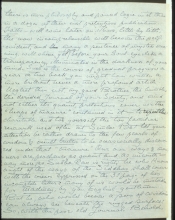
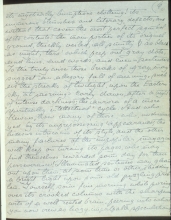
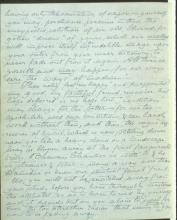

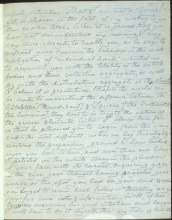
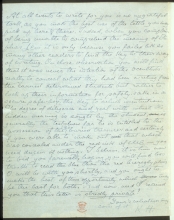

Siddham in Tamil means "one who is accomplished" and refers to yogis who have transcended the personal ego, subdued their minds and purified their bodies.